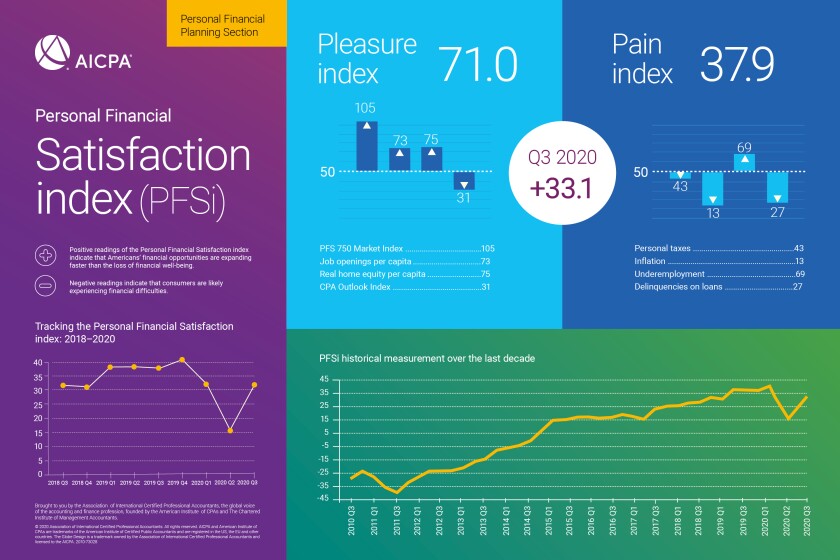Financial satisfaction of people in the U.S. rebounded strongly in the third quarter of the year, according to a new survey by the American Institute of CPAs, reversing the lows in the second quarter in the midst of the recession brought on by the novel coronavirus pandemic.
The AICPA’s Q3 2020 Personal Financial Satisfaction Index measured 33.1, representing a whopping 99 percent (16.5 point) increase from the previous quarter. That’s the biggest quarterly increase in the 27-year history of the PFSi, and a complete turnaround from the second quarter, when the index had its largest ever quarterly drop.
Bryan Robertson is a seasoned commercial insurance professional with over 15 years of extensive experience in the industry. As a 5th-generation Central Floridian, he brings a deep connection to the region, understanding the unique challenges and opportunities that businesses face. Throughout his career, Bryan has demonstrated a complex understanding of risk management, coverage negotiations, and client relationship management, helping middle market and larger corporations secure comprehensive insurance solutions tailored to their unique needs. In the fall of 2020, Bryan, along with two partners, acquired Hatcher Insurance.
Under their leadership, the company has experienced significant growth, expanding from a team of 5 to over 30 employees. This rapid expansion reflects their commitment to excellence and their ability to adapt to the evolving needs of the market. Rooted in the rich family heritage of Central Florida business owners, Bryan is committed to contributing to the growth and prosperity of his community through his business.
Bryan is recognized for his leadership and mentorship abilities, having led teams to achieve record industry new business growth. Leading to recognition by the Orlando Business Journals' class of 2022 – Top 40 under 40.
Date: Wednesday, May 14, 2025
The PFSi is built around various factors, including the labor market. The gains can be mainly attributed to improvements in job openings per capita and underemployment. Those had the biggest impact on increasing the overall PFSi. The biggest factor driving the quarter-over-quarter rally was a 35 percent (37 point) decrease in underemployment. A decrease in underemployment improves overall financial satisfaction in the index. While there was an improvement in underemployment in the third quarter from Q2’s record high, it’s still 117 percent above its level a year ago. For the second consecutive quarter, underemployment is still the biggest negative contributor to the average American’s personal financial satisfaction. The Q3 underemployment level reflects data measured through the middle of September.
“As Americans continue to navigate the economic impact of the COVID-19 pandemic, it is important to remember that the fundamentals of financial planning haven’t changed,” said AICPA PFS Credential Committee chair Dave Stolz in a statement Thursday. “Though the stock market’s record performance is encouraging, 2020 has served as a reminder of the volatile nature of markets. As the impact of COVID-19 continues to play out across the country, investors should weigh their risk tolerance and ensure they have ample cash on hand. Further, a tax-efficient financial plan that includes a diversified portfolio can give confidence that long-term financial goals will remain within reach through this period of extreme uncertainty.”
The coronavirus put millions out of work, prompting job openings per capita to show a record plummet earlier this year. In the third quarter, job openings started to recover, climbing 37 percent (20 points) compared to Q2. That factor is now only 10 percent below its measurement a year ago before the pandemic. The Q3 index comes from July data from the U.S. Bureau of Labor Statistics.




